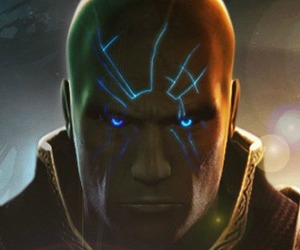 Title: Too Human
Title: Too Human
Developer: Silicon Knights
Publisher: Microsoft Game Studios
First Released: August 29, 2008
Available on: Xbox 360 only
Metacritic Score: 65/100
Hubris is a funny thing.
I mean, there’s nothing inherently wrong with being proud – even confident – of something you’ve created, even aggressively so, as long as what you’ve created lives up to the hype that your confidence is generating.
It’s fair to say that Silicon Knights’ Denis Dyack knows a thing or two about hubris. Too Human was a labour of love for his team that began way back in 1999 with an idea for a sci-fi action game. Originally planned to ship on four discs for Sony’s PlayStation, Too Human instead found itself cast hither and thither for almost ten years, missing not a single pillar nor solitary post in the creative purgatory we know commonly as Development Hell.
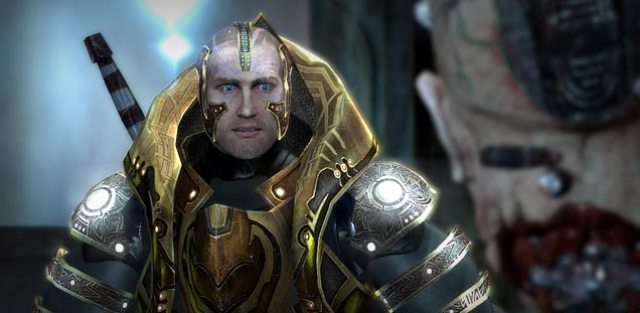
NO MORE ROOM IN HELHEIM: During those nine and a bit years, Too Human changed, got a new engine, a new setting, a new premise, but all the while as it was changing in subtle ways, a little at a time, the games industry was going through its own metamorphosis, and by the time Dyack’s game was ready to ship for the Xbox 360, its graphics were already dated and its interesting premise already vanilla’d. Further calamity struck when Silicon Knights attempted to sue Epic Games over the Unreal Engine, which they claimed wasn’t fit for purpose. Long story short, Epic’s counter-suit cost Silicon Knights $4.5 million in an ongoing legal battle that recently cost them another $4.9 million in legal fees and charges. Ouchy.
It seemed that Silicon Knights just couldn’t catch a break with Too Human, especially when the community of gaming website NEOGAF took to liberally hating on the unfinished game, trolling it daily over the constant delays, screenshots of poor quality artwork and a general lack of pizazz after almost a decade in development. It’s at this point that the aforementioned hubris came into play, and very nearly hammered the final nail into Denis Dyack’s self-made coffin.
“When the game is released, and everyone plays it, all the speculation will be over. If I am wrong and gamers in general think the game is ‘crap’ then I am comfortable with getting tagged ‘Owned by the GAF’. Every single other person who thinks or hopes the game will be an epic failure gets their own tag: ‘Owned by Too Human’.” – Denis Dyack
In internet terms, this is sticking your head in an alligator’s mouth with a sweaty brow. It’s only a matter of time before one runaway bead loses you everything above the shoulders. The game hit shelves, the world labelled it “crap”, and Dyack was indeed owned. And it’s a shame, really. In fact, you could argue that Too Human’s fate calls into question the internet’s affect on creativity in general. Had Dyack not gone on record as issuing that challenge, perhaps Too Human would have been less hated. Instead, it’s a sad fact that even some professional journalists went into Silicon Knights’ RPG expecting – even hoping – to find serious fault. And find it they did, picking Too Human apart to bemoan even flaws that might have been ignored elsewhere. Bad graphics? Undoubtedly, but then how often do you hear variations on the term “graphics don’t make the game”? The combat system is gimmicky and repetitive? Perhaps, but it’s also unique and fun for a long time before it starts to become a grind, by which point you’re approaching end-game and your character is powerful and hardy enough to make full and proper use of it.
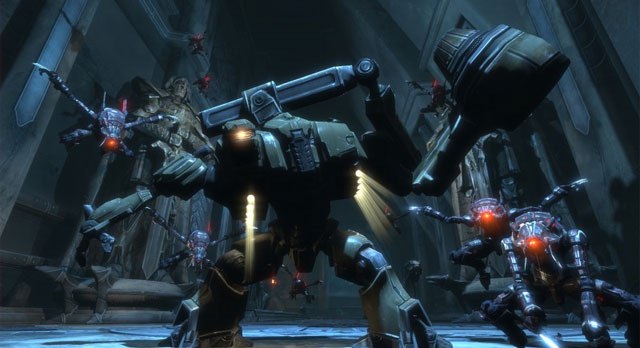
STORY BORED: Too Human’s narrative background is interesting, placing the story either in the far distant future or the ancient past. Having been decimated by an army of machines called the Children of Ymir (and known commonly as Frost Giants), humanity now resides in the great walled enclave of Midgard, protected by the Aesir, a race of cybernetically-enhanced humans revered as Gods.
The story (intended as the genesis of a trilogy that never was) follows Baldur, youngest of the Norse pantheon that exist in an Asgard built half on Viking mythology and half on science fiction. As Baldur has less augmentations than his siblings he is considered weaker, or “too human”, as the case may be. Having lost his lover Hel and been killed himself, the resurrected Baldur enters the story sans memory, in recovery both emotionally and physically. Through a series of excursions into the Frost Giant-infested dark corners of Asgard he rebuilds his power, whilst at the same time uncovering a conspiracy by Loki to use a weapon of mass destruction to overthrow ODIN (the Organically Distributed Intelligence Network; an immense A.I. that runs Asgard) and seize control of Midgard, Asgard and Cyber-Space, a digital sub-dimension where A.I. programs masquerading as Norse spirits reside.
The plot isn’t greatly coherent, certainly isn’t original, and between uncomfortable voice acting and horribly last-gen graphics it’s delivery is only so-so, and yet if you can somehow get by that it’s enjoyably hammy. The climactic twist is signposted, but acts as the perfect set-up for the sequel that never came. Sadly, a sequel might have given Silicon Knights a chance to correct what many perceived to be gargantuan flaws, including the aforementioned opinion-splitting combat.
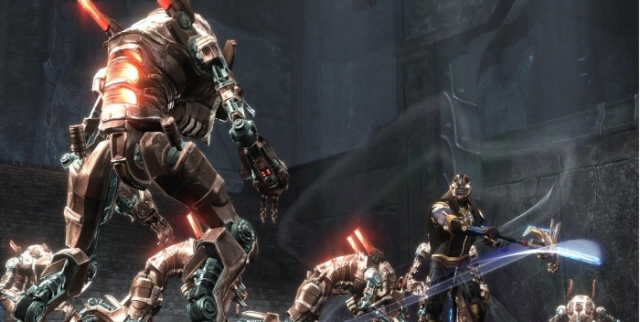
BATTLE LINES: The action in Too Human is actually its stand-out feature, and was the only element that was praised slightly more than derided. It plays like a variant of the twin-stick system usually employed by top-down shooters: The left stick controls protagonist Baldur around the screen, while pushing the right stick in any direction causes him to launch an attack. With the right timing, zipping him around the battlefield, sliding from foe to foe and mixing finishers and counters becomes incredibly satisfying. That Baldur’s movements are slick and responsive is a major boon, and when you mix in ranged combat (either with pistols, cannon’s or rifles) and devastating special attacks, it starts to look quite deep.
A major factor is “juggling”, launching an enemy up into the air and holding them aloft with gunplay or sustained aerial attacks. Experienced players can juggle multiple enemies, barely standing still long enough to take a hit. It’s a unique system that deserves more credit, and should have been built upon by other developers.
To begin with, Baldur is woefully underpowered and death will visit the foolish with disheartening frequency, but as you progress you’ll unlock better gear, collect item sets and improve your skills immensely. Death is rarely punished beyond having to endure a 30-second animation in which a gold-clad Valkyrie maiden resurrects you, itself enough to condemn Silicon Knights for what many still regard as the most annoying respawn system ever devised. The trick to circumventing it and enjoying the game more? Get better and die less. Zing!
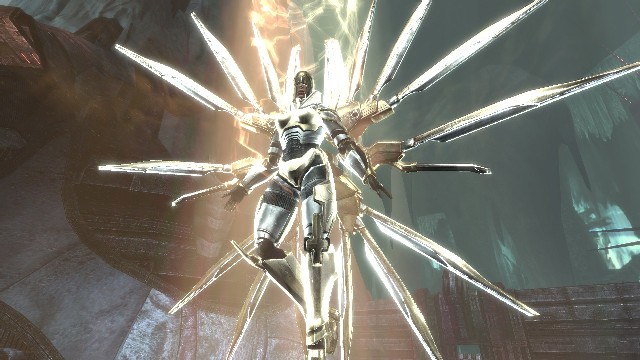
NORSING AROUND: The class system in Too Human allows for a certain amount of freedom in both combat and character progression, but the skill trees are underused and not particularly inspired, with the majority of unlockable skills buffing attributes or improving existing talents. As a result, class selection comes down to play-style alone. Do you want a dual-wielding speed demon like the Berserker, or a cannon-toting tank like the Commando? Maybe you’ll hedge your bets and stick with the default Guardian class. There are five options available and they make a marked difference to gear and tactics.
The inclusion of cooperative multiplayer, New Game+ and replayable areas built purely for grinding and farming those rare item sets extend the game beyond its relatively short campaign, but these days you won’t find many playing online to experience the former. Even directly after its release Too Human wasn’t hugely popular, though now its cult status at least means it’s always being played by someone, somewhere.
Too Human is not a horrendous game, not in real terms. It gets an awful lot wrong, for sure, but it gets some things right, too. Perhaps the fresh combat, interesting premise and party-based multiplayer aren’t enough to balance the bad graphics, repetitive gameplay and awful voice-acting, but claiming that it’s the worst game ever made is outright trolling. It’s broken in places, but if not for the lofty promises and perceived arrogance of its creator, it might have done much better.
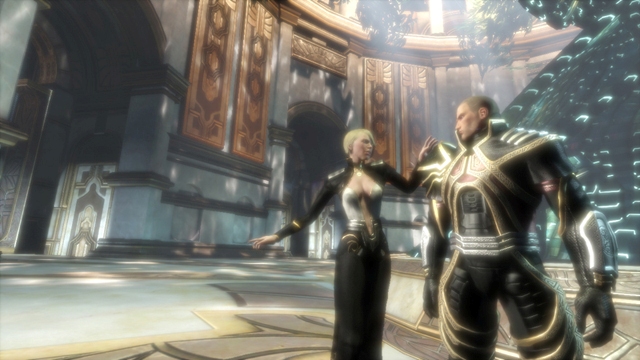
CAUTIONARY TALE: In the end, Too Human doesn’t teach us much about video games, either about getting them right or getting them wrong. It doesn’t teach us about Norse mythology, speculative science fiction nor the human condition. All it really teaches us about is hubris, about how too much confidence, made too vocal, can be more harmful than no confidence at all.
It teaches us that if you’re going to challenge the great and powerful internet, confidence alone isn’t enough – you’d better be damn sure that what you’re creating is as good as, or better than, anything that has come before.
Otherwise, 9 times out of 10, you will be owned. Just ask Denis Dyack.





